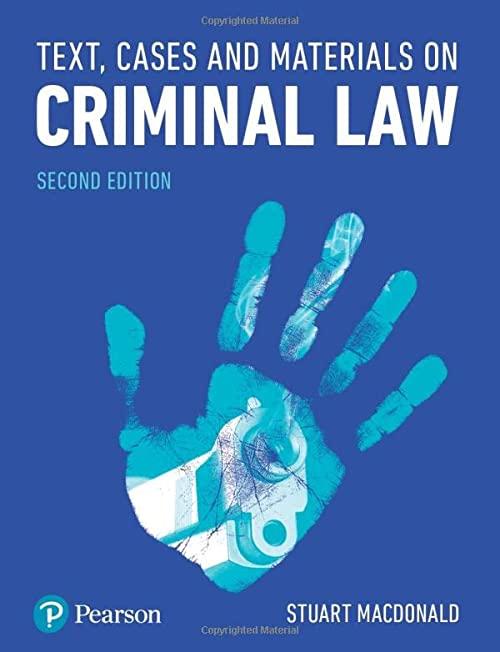Question
Hi, I have an assignment for Property Rights and Landlord Tenant Law and was hoping someone could help me out as I am struggling to
Hi, I have an assignment for Property Rights and Landlord Tenant Law and was hoping someone could help me out as I am struggling to identify the relevant law that is applicable to this certain legal issue. This is the question below.
In 1870, John Donne purchased a fee simple interest from the Crown in 200 acres of land outside Moree, in north western NSW. In 1890, Donne secured an adjoining 100 acres of land on a 75-year pastoral lease, with an option to renew for a further 75 years. The terms of the lease allowed the lessee to run cattle or sheep on the land, to fence where necessary and to build housing or agricultural structures. The lessee was prohibited from transferring the lease or subleasing and the lessor reserved to itself the power to sell, lease or otherwise dispose of any interest in the land, as well as the right to enter at any time, for any purpose. The lessee was also required to maintain open access ways for the passage of people and stock. John built a large homestead on the land the subject of the pastoral lease.
1
In 1912, gold was discovered in the region. A mining company calledClive's Last Stand Pty Ltd ('CLS')applied for and was granted a mining lease over half of the pastoral lease. It established a mine and processing plant covering 5 acres, which was protected by a fence over eight feet high. CLS successfully mined gold for 8 years, after which it packed up and left.
John died in 1925, leaving all his real property to his youngest son, Andrew. Andrew farmed both parcels of land throughout his life and exercised the option to renew the pastoral lease in 1964. Andrew died in 2001 leaving all his real property to his daughter, Anna.Anna now consults you about whether it is possible that native title rights exist over any part of the farm.
Your answer should take the form of an opinion for each question you are asked. That is:(1) Identify the legal issue you are being asked to answer;
(2) Identify the relevant law applicable to the legal issue you are answering;
(3) Apply the relevant law to the relevant facts from the question;
(4) Clearly express your opinion/conclusion as to the expected legal result to the problem.
Step by Step Solution
There are 3 Steps involved in it
Step: 1

Get Instant Access to Expert-Tailored Solutions
See step-by-step solutions with expert insights and AI powered tools for academic success
Step: 2

Step: 3

Ace Your Homework with AI
Get the answers you need in no time with our AI-driven, step-by-step assistance
Get Started


